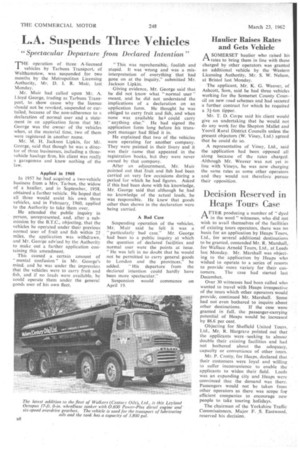L.A. Suspends Three Vehicles
Page 42

If you've noticed an error in this article please click here to report it so we can fix it.
Spectacular Departure from Declared Intention"
THE operation of three A-licensed vehicles by Tarbuns Transport, of Walthamstow, was suspended for two months by the Metropolitan Licensing Authority, Mr. D. I. R. Muir, last Monday.
Mr. Muir had called upon Mr. A. Lloyd George, trading as Tarbuns Transport, to show cause why the licence should not be revoked, suspended or curtailed, because of the non-adherence to a declaration of normal user and a statement in an application form that Mr. George was the owner of the vehicles when, at the material time, two of them were registered in another name.
Mr. M. H. Jackson Lipkin, for Mr. George, said that though he was a director of three businesses, including a threevehicle haulage firm, his client was really a garageman and knew nothing of the law.
Applied in 1960 In 1957 he had acquired a two-vehicle business from a Mrs. Tarbun, the widow of a haulier, and in September, 1958, obtained a further vehicle. He hoped that all three would assist his own three vehicles, and in February, 1960, applied to the Authority to take them over.
He attended the public inquiry in person, unrepresented, and, after a submission by the B.T.C., objecting, that the vehicles be operated under their previous normal user of fruit and fish within 25 miles, the application was withdrawn, and Mr. George advised by the Authority to make out a further application containing this amendment.
This caused a certain amount of "mental confusion" in Mr. George's mind, and he was under the impression that the vehicles were to carry fruit and fish, and if no loads were available, he could operate them under the general goods user of his own fleet. "This was reprehensible, foolish and stupid. It was wrong and was a misinterpretation of everything that had gone on at the inquiry," submitted Mr. Jackson Lipkin.
Giving evidence, Mr. George said that he did not know what "normal user" meant, and he did not understand the implications of a declaration on an application form. He thought he was obliged to carry fruit and fish, and when none was available he could carry 'anything else." He had signed the application form long before his transport manager had filled it in.
He explained that two of the vehicles were operating for another company. They were painted in their livery and it was their name that appeared in the registration books, but they were never owned by that company.
After an adjournment, Mr. Muir pointed out that fruit and fish had been carried on very few occasions during a period for which he had figures. Asked if this had been done with his knowledge, Mr. George said that although he had no knowledge of the actual loads, he was responsible. He knew that goods other than shown in the declaration were being carried.
A Bad Case Suspending operation of the vehicles, Mr. Muir said he felt it was a "particularly bad case," Mr. George had been to a public inquiry at which the question of declared faciJities and normal user were the points at issue. " He was left in no doubt that he would not be permitted to carry general goods to London and the provinces," he added. " His departure from the declared intention could hardly have been more spectacular."
Suspension would commence on April 19.




















































































































